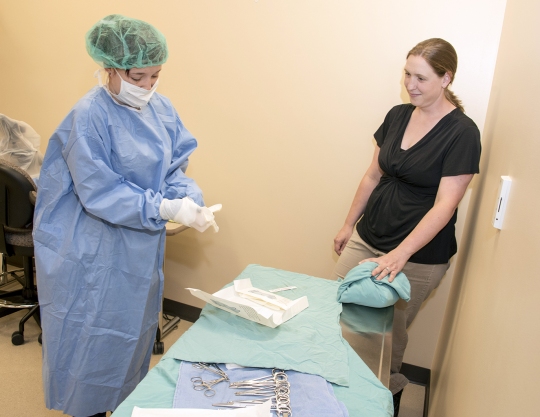 College of Southern Maryland Veterinary Assistant Program lab instructor Meg Hamilton, back, looks on as student Regina Baker practices sterile gowning and gloving techniques. The first of five courses in the 10-month program begins Aug. 23.
College of Southern Maryland Veterinary Assistant Program lab instructor Meg Hamilton, back, looks on as student Regina Baker practices sterile gowning and gloving techniques. The first of five courses in the 10-month program begins Aug. 23.LA PLATA, Md. (July 28, 2016)—The College of Southern Maryland can get students on the path to a career in the fast-growing veterinary assistant field.
Students can take advantage of CSM's career development training for veterinary assistants which begins in August and can be completed in less than a year. Registration for the prep course is now underway.
"The CSM Veterinary Assistant Program gets students into the field quickly," said Shaunda Holt, program coordinator for adults in the college's Personal Enrichment Department.
The courses are taught from August to May. There are five classes that must be completed.
CSM has offered its vet assistant program for 17 years. As of 2015, the 153-hour, five-class training program, which includes lecture and laboratory hours, ends with a veterinary assistant continuing education certificate from the college. Students must complete a no-cost application for the certificate.
"This certificate will afford students 'better than a foot in the door' opportunities for employment at laboratories, veterinary hospitals and animal sanctuaries," Holt said.
The new laboratory portion of the program opened on the La Plata Campus last year. The lab offers hands-on experience for students in conjunction with the lecture portion offered since 1999.
"The curriculum was rewritten to provide more contact time with the students," said Susan Newhart, the course instructor who is a registered veterinary technician with 25 years of experience in the veterinary field. All of the program's instructors are certified technicians in the region.
Employment of veterinary assistants and laboratory animal caretakers is projected to grow 9 percent from 2014 to 2024, faster than the average for all occupations, and the median annual wage in the field was $24,360 in May 2015, according to the Bureau of Labor Statistics.
Veterinary assistants feed and water animals, disinfect cages and work areas, sterilize laboratory and surgical equipment, provide routine post-operative care, and administer medication orally or topically as directed. Veterinary technicians have knowledge of the medical equipment (such as X-ray machines, heart machines, etc.), administer inoculations, prepare and restrain animals during procedures, suture and dress wounds, and advise pet owners on proper care. Veterinarians perform medical tests in a laboratory environment for use in the treatment and diagnosis of diseases in animals. Besides preparing serums for prevention of diseases, a veterinarian assistant prepares tissue samples, takes blood samples and executes lab tests, such as urinalysis and blood counts.
The first course is SCI-7090 Veterinary Assistant Preparation Course. The vet prep class will be offered 6:30 to 9:30 p.m. Tuesdays and Thursdays, Aug. 23-30 at the La Plata Campus in the Community Education Building, Room CE 101. To register and for more information, visit http://www.csmd.edu/programs-courses/non-credit/career-development/veterinarian/.
Students in the class brush up on their basic skills and prepare to start classroom and lab training to become veterinary assistants. The nine-hour preliminary course is required for all students who wish to take the vet assistant series.
Topics in the first class include problem-solving skills, written and verbal communication, math for medications, confidentiality, professionalism, ethics, and classroom and lab conduct. Those taking the class must be 18 years of age or older. Students must successfully pass the prep course in order to move on to the rest of the veterinary assistant series.
The continuing education certificate also consists of these courses, which must be taken in order:
• SCI-7100 Veterinary Assistant I: Client Relations and Exam Room Procedures
• SCI-7110 Veterinary Assistant II: Diagnostic/Pharmacy
• SCI-7120 Veterinary Assistant III: Patient Care and Nursing
• SCI-7130 Veterinary Assistant IV: Surgery, Anesthesia, and Emergency Care
For information on the course, email conedops@csmd.edu or call 301-539-4760.
For a complete listing of continuing education courses, including course descriptions, visit http://www.csmd.edu/programs-courses/non-credit/schedules/.

